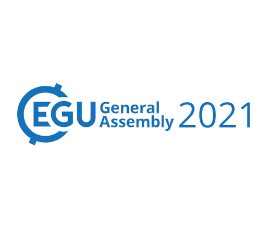European Geosciences Union General Assembly 2021
- Start: Apr 26, 2021
- End: Apr 30, 2021
- Location: Virtual
- Host: Markus Reichstein, Dorothea Frank, Nuno Carvalhais, Ana Bastos, Mirco Migliavacca, Richard Nair,

BG3.7 Present and future global vegetation dynamics and carbon stocks from observations and models
(Co-)Convener: Ana Bastos
vPICO presentations: Fri, 30 Apr, 2021 11:00–12:30 (CEST)
The terrestrial vegetation carbon balance is controlled not just by
photosynthesis, but by respiration, carbon allocation, turnover
(comprising litterfall, background mortality and disturbances) and wider
vegetation dynamics. Observed, and likely future, changes in vegetation
structure and functioning are the result of interactions of these
processes with atmospheric carbon dioxide concentration, climate and
human activities. The quantification and assessment of such changes has
proven extremely challenging because of a lack of observations at large
scales and over the long time periods required to evaluate trends.
We welcome contributions that make use of observational approaches,
vegetation models, or model-data integration techniques to advance
understanding of the effects of environmental change on vegetation
dynamics, tree mortality and carbon stocks and fluxes at local, regional
or global scales and/or at long time scales
(Co-)Convener: Markus Reichstein; Dorothea Frank
vPICO presentations: Wed, 28 Apr, 2021 09:00-12:30
Extreme climate and weather events, associated disasters and emergent
risks are becoming increasingly critical in the context of global
environmental change and interact with other stressors. They are a
potential major threat to reaching the Sustainable Development Goals
(SDGs) and one of the most pressing challenges for future human
well-being.
This session explores the linkages between extreme climate and weather
events, associated disasters, societal dynamics and resilience.
Emphasis is laid on 1) Which impacts are caused by extreme climate
events (including risks emerging from compound events) and cascades of
impacts on various aspects of ecosystems and societies? 2) Which
feedbacks across ecosystems, infrastructures and societies exist? 3)
What are key obstacles towards societal resilience and reaching the
SDGs, while facing climate extremes? 4) What can we learn from past
experiences? 5) What local to global governance arrangements best
support equitable and sustainable risk reduction?
We welcome empirical, theoretical and modelling studies from local to
global scale from the fields of natural sciences, social sciences,
humanities and related disciplines
(Co-)Convener: Richard Nair
vPICO presentations: 30 Apr, 2021 13:30–15:00 (CEST)
The need to predict ecosystem responses to anthropogenic change,
including but not limited to changes in climate and increased
atmospheric CO2 concentrations, is more pressing than ever. Global
change is inherently multi-factorial and as the terrestrial biosphere
moves into states without a present climate analogue, mechanistic
understanding of ecosystem processes and their linkages with vegetation
diversity and ecosystem function is vital to enable predictive capacity
in our forecast tools.
This session aims to bring together scientists interested in advancing
our fundamental understanding of vegetation and whole-ecosystem
processes. We are interested in contributions focused on advancing
process- and hypothesis-driven understanding of plant ecophysiology,
biodiversity and ecosystem function. We welcome studies on a range of
scales from greenhouse and mesocosm experiments to large field
manipulative experiments, remote sensing studies and process-based
modelling. We encourage contributions of novel ideas and hypotheses in
particular those from early stage researchers and hope the session can
create an environment where such ideas can be discussed freely.
(Co-)Convener: Mirco Migliavacca, Markus Reichstein
vPICO presentations: Tue, 27 Apr, 2021 15:30-17:00
During the last decade, technological developments in field
spectroscopy, including remote and proximal sensing of sun-induced
fluorescence, as well as in isotope flux measurements and quantum
cascade lasers have enabled alternative approaches for constraining
ecosystem-scale photosynthesis, respiration and transpiration. On the
other hand a variety of approaches have been developed to directly
assess the gross fluxes of CO2 and transpiration by using both process
based and empirical models, and machine learning techniques.
In this session, we aim at reviewing recent progress made with novel
approaches of constraining ecosystem gross photosynthesis, respiration
and transpiration and at discussing their weaknesses and future steps
required to reduce the uncertainty of present-day estimates. To this end
we are seeking contributions that use emerging constrains to improve
the ability to quantify respiration and photosynthesis processes,
transpiration and water use efficiency, at scales from leaf to ecosystem
and global. Particularly welcome are studies reporting advancements and
new developments in CO2 and evapotranspiration flux partitioning from
eddy covariance data, the use of carbonyl sulfide, stable isotopes
approaches, and sun-induced fluorescence.
(Co-)Convener:nAna Bastos
vPICO presentations | Mon, 26 Apr, 2021 15:30–17:00 (CEST)
Adapting to climate change in the Mediterranean region represents a
critical socio-economic and environmental challenge. Different levels of
exposure and vulnerability as well as different projected changes
characterize the Mediterranean region. Understanding the past,
characterizing the present and modelling the future are therefore
essential steps to estimate the risks, assess the impacts of climate
change, and identify potential adaptation and mitigation strategies.
This multidisciplinary MedCLIVAR session encourages contributions from a
broad range of disciplines and topics, e.g. dealing with: dynamics and
processes of the climate system; sectorial impacts of climate change;
climate change adaptation and mitigation; innovative methods and
approaches in climate science. The session focuses on all time scales
from paleoclimate to future model projections as well as on all relevant
socio-economic sectors.